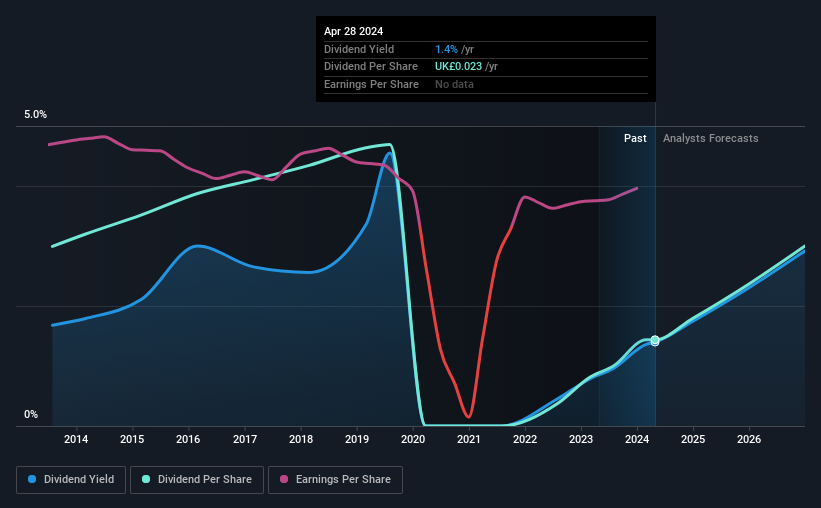Stock Analysis
- United Kingdom
- /
- Aerospace & Defense
- /
- LSE:SNR
Don't Buy Senior plc (LON:SNR) For Its Next Dividend Without Doing These Checks

Readers hoping to buy Senior plc (LON:SNR) for its dividend will need to make their move shortly, as the stock is about to trade ex-dividend. Typically, the ex-dividend date is one business day before the record date which is the date on which a company determines the shareholders eligible to receive a dividend. The ex-dividend date is important as the process of settlement involves two full business days. So if you miss that date, you would not show up on the company's books on the record date. In other words, investors can purchase Senior's shares before the 2nd of May in order to be eligible for the dividend, which will be paid on the 31st of May.
The company's next dividend payment will be UK£0.017 per share. Last year, in total, the company distributed UK£0.023 to shareholders. Based on the last year's worth of payments, Senior stock has a trailing yield of around 1.4% on the current share price of UK£1.644. Dividends are an important source of income to many shareholders, but the health of the business is crucial to maintaining those dividends. As a result, readers should always check whether Senior has been able to grow its dividends, or if the dividend might be cut.
See our latest analysis for Senior
Dividends are usually paid out of company profits, so if a company pays out more than it earned then its dividend is usually at greater risk of being cut. Fortunately Senior's payout ratio is modest, at just 31% of profit. Yet cash flow is typically more important than profit for assessing dividend sustainability, so we should always check if the company generated enough cash to afford its dividend. Over the past year it paid out 120% of its free cash flow as dividends, which is uncomfortably high. We're curious about why the company paid out more cash than it generated last year, since this can be one of the early signs that a dividend may be unsustainable.
While Senior's dividends were covered by the company's reported profits, cash is somewhat more important, so it's not great to see that the company didn't generate enough cash to pay its dividend. Were this to happen repeatedly, this would be a risk to Senior's ability to maintain its dividend.
Click here to see the company's payout ratio, plus analyst estimates of its future dividends.

Have Earnings And Dividends Been Growing?
When earnings decline, dividend companies become much harder to analyse and own safely. If earnings fall far enough, the company could be forced to cut its dividend. Readers will understand then, why we're concerned to see Senior's earnings per share have dropped 9.9% a year over the past five years. Ultimately, when earnings per share decline, the size of the pie from which dividends can be paid, shrinks.
Another key way to measure a company's dividend prospects is by measuring its historical rate of dividend growth. Senior has seen its dividend decline 7.1% per annum on average over the past 10 years, which is not great to see. It's never nice to see earnings and dividends falling, but at least management has cut the dividend rather than potentially risk the company's health in an attempt to maintain it.
The Bottom Line
From a dividend perspective, should investors buy or avoid Senior? It's disappointing to see earnings per share declining, and this would ordinarily be enough to discourage us from most dividend stocks, even though Senior is paying out less than half its income as dividends. However, it's also paying out an uncomfortably high percentage of its cash flow, which makes us wonder just how sustainable the dividend really is. It's not the most attractive proposition from a dividend perspective, and we'd probably give this one a miss for now.
Curious what other investors think of Senior? See what analysts are forecasting, with this visualisation of its historical and future estimated earnings and cash flow.
A common investing mistake is buying the first interesting stock you see. Here you can find a full list of high-yield dividend stocks.
Valuation is complex, but we're helping make it simple.
Find out whether Senior is potentially over or undervalued by checking out our comprehensive analysis, which includes fair value estimates, risks and warnings, dividends, insider transactions and financial health.
View the Free AnalysisHave feedback on this article? Concerned about the content? Get in touch with us directly. Alternatively, email editorial-team (at) simplywallst.com.
This article by Simply Wall St is general in nature. We provide commentary based on historical data and analyst forecasts only using an unbiased methodology and our articles are not intended to be financial advice. It does not constitute a recommendation to buy or sell any stock, and does not take account of your objectives, or your financial situation. We aim to bring you long-term focused analysis driven by fundamental data. Note that our analysis may not factor in the latest price-sensitive company announcements or qualitative material. Simply Wall St has no position in any stocks mentioned.
About LSE:SNR
Senior
Senior plc designs, manufactures, and sells high-technology components and systems for the principal original equipment manufacturers in the aerospace, defense, land vehicle, and power and energy markets in the United States, the United Kingdom, and internationally.
Very undervalued with solid track record.

